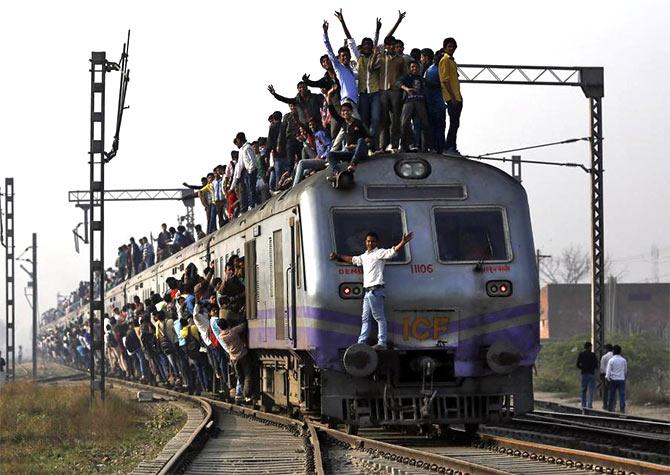'The new trains should be fast, but the roll-out of the privatisation plan should be slow and well-considered,' recommends T N Ninan.

The issues to do with privatising railway services are not matters of principle, but practical questions to make the exercise a success.
Many countries have privatised parts or all of their railway operations: The UK, Japan, Canada, Sweden, Australia, New Zealand, and so on.
Egypt has started the process while Argentina has moved much further down the road (or rail track).
Many of these countries had begun a century or more ago with private railways, nationalised them when railway companies ran into trouble, and are now rolling back state ownership and/or operations.
India too began with private railway companies in the middle of the 19th century, nationalised them in 1951, and is now taking the first tentative steps in the opposite direction.
Habibganj, the first private railway station (outside Bhopal), will soon be joined by 50 others; the initial plan was for 400.
The two 'private' Tejas trains (private in name only, because they are run by a State-owned company) will grow to 150 -- hardly a big deal when there are 7,000 passenger trains being operated daily.
Besides, the private dominance of most other forms of transport is already a fact of life: Ports and shipping, airports and airlines, toll roads, and passenger bus and trucking services.
Only the railways remains a government monopoly.
So the issue is not an ideological one, of State or private ownership, but the fact that the privatisation of rail operations is far more complicated than with other forms of transport.
Indeed, private railways has a chequered history.
The construction and operations of the Indian Railways in the mid-19th century were done by private companies with capital that was given a guaranteed return of 5 per cent.
The scandalous history of how this turned out (the Indian taxpayer ended up paying Britain up to 4 per cent of GDP every year, much of it on account of the railways) was forgotten when the first private power generation companies were also offered guaranteed returns late in the 20th century.
When the first coast-to-coast railway line was laid in the United States in the latter half of the 19th century, among the incentives offered was free land that was bigger in acreage than entire states.
The more contemporary privatisation of British rail, Thatcher style, has also been endlessly controversial, but Japan operates more than half a dozen private railway systems with overlapping operations on common rail networks.
India had little success when it launched private container freight operations a few years ago.
And a proposal in the 1990s to privatise railway workshops was short-lived.
The risks and problems are obvious.
With the railways operating in competition with new private trains, the obvious conflict of interest could lead to disputes -- but there is no regulator proposed for settling them.
There is serious lack of carrying capacity on the trunk routes, on which many of the proposed private trains are supposed to run.
And viability is an obvious question when the railways routinely cross-subsidises passenger traffic with the revenue from freight operations, and when air fares can often be surprisingly cheap.
On top of all this, the mutual dependence between the existing railways and new private train operators will work smoothly only if the charges for services provided are manifestly fair.
In the case of airports, some airlines have complained of excessive airport charges, once asserting that these are among the highest in the world.
One hesitates once again to suggest the need for a sector regulator, given the unsatisfactory experience with such regulators in other sectors (telecom, aviation, etc). But there is no alternative.
Given these unresolved issues and complexities, it is just as well that the government is hastening slowly, one step at a time.
The experience with 50 stations and 150 trains should be a learning experience, helping those in charge to frame sensible rules that are not unfair to the new operators but without attracting charges of crony capitalism, criticism by the government's auditor, and thereby potential scandal and court battles.
The new trains should be fast, but the roll-out of the privatisation plan should be slow and well-considered.











